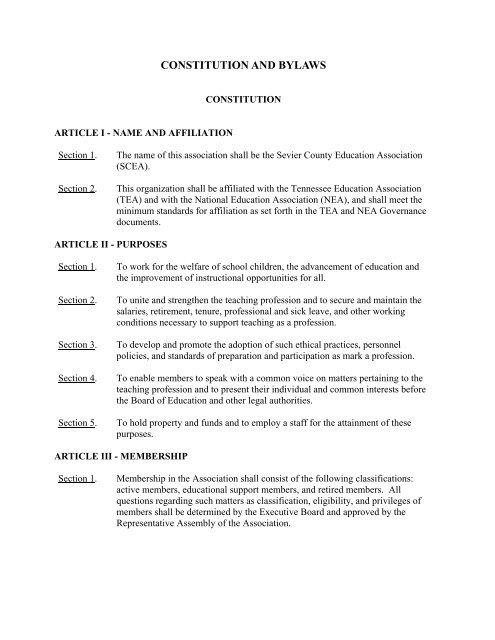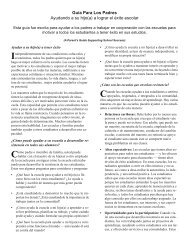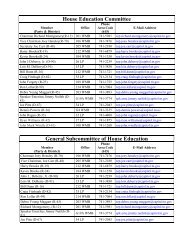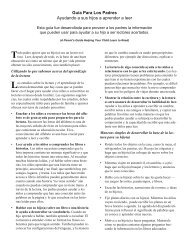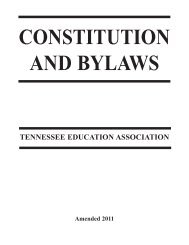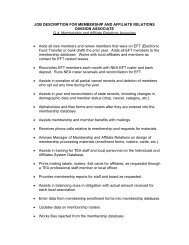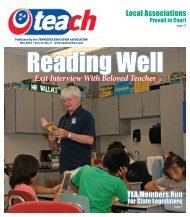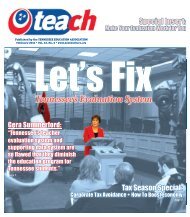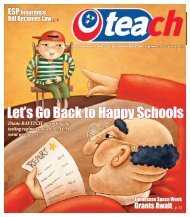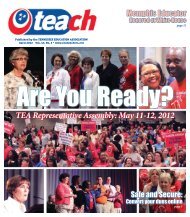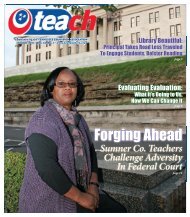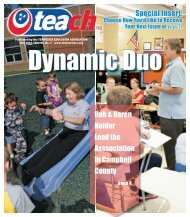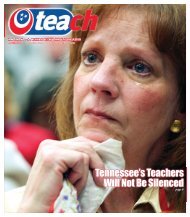CONSTITUTION AND BYLAWS - Tennessee Education Association
CONSTITUTION AND BYLAWS - Tennessee Education Association
CONSTITUTION AND BYLAWS - Tennessee Education Association
Create successful ePaper yourself
Turn your PDF publications into a flip-book with our unique Google optimized e-Paper software.
<strong>CONSTITUTION</strong> <strong>AND</strong> <strong>BYLAWS</strong><br />
<strong>CONSTITUTION</strong><br />
ARTICLE I - NAME <strong>AND</strong> AFFILIATION<br />
Section 1.<br />
Section 2.<br />
The name of this association shall be the Sevier County <strong>Education</strong> <strong>Association</strong><br />
(SCEA).<br />
This organization shall be affiliated with the <strong>Tennessee</strong> <strong>Education</strong> <strong>Association</strong><br />
(TEA) and with the National <strong>Education</strong> <strong>Association</strong> (NEA), and shall meet the<br />
minimum standards for affiliation as set forth in the TEA and NEA Governance<br />
documents.<br />
ARTICLE II - PURPOSES<br />
Section 1.<br />
Section 2.<br />
Section 3.<br />
Section 4.<br />
Section 5.<br />
To work for the welfare of school children, the advancement of education and<br />
the improvement of instructional opportunities for all.<br />
To unite and strengthen the teaching profession and to secure and maintain the<br />
salaries, retirement, tenure, professional and sick leave, and other working<br />
conditions necessary to support teaching as a profession.<br />
To develop and promote the adoption of such ethical practices, personnel<br />
policies, and standards of preparation and participation as mark a profession.<br />
To enable members to speak with a common voice on matters pertaining to the<br />
teaching profession and to present their individual and common interests before<br />
the Board of <strong>Education</strong> and other legal authorities.<br />
To hold property and funds and to employ a staff for the attainment of these<br />
purposes.<br />
ARTICLE III - MEMBERSHIP<br />
Section 1.<br />
Membership in the <strong>Association</strong> shall consist of the following classifications:<br />
active members, educational support members, and retired members. All<br />
questions regarding such matters as classification, eligibility, and privileges of<br />
members shall be determined by the Executive Board and approved by the<br />
Representative Assembly of the <strong>Association</strong>.
Section 2.<br />
Active Members<br />
A. Active membership in the <strong>Association</strong> shall be open to all professional<br />
and classified personnel employed in the schools of Sevier County who<br />
hold any certificate required by their employment. Active membership is<br />
limited to persons who agree to abide by the Code of Ethics of this<br />
<strong>Association</strong>. An active member is entitled to all rights and privileges of<br />
membership in this local association.<br />
B. Active members of the <strong>Association</strong> shall also maintain membership in the<br />
<strong>Tennessee</strong> <strong>Education</strong> <strong>Association</strong> and the National <strong>Education</strong><br />
<strong>Association</strong>.<br />
C. Membership shall become effective upon payment of annual dues in<br />
accordance with the provisions of this Constitution and Bylaws and with<br />
the policies and regulations adopted by the Representative Assembly of<br />
the <strong>Association</strong>. Active membership shall be continuous until the<br />
member leaves the school system, resigns from the <strong>Association</strong>, fails to<br />
pay membership dues, or fails to comply with all rules and regulations of<br />
this local <strong>Association</strong>.<br />
Section 3.<br />
Retired Members<br />
A. Active members who retire may continue as honorary members for life.<br />
B. Retired members shall not be eligible to vote, hold office, or represent the<br />
<strong>Association</strong> but shall be eligible to have a committee of ex officio,<br />
nonvoting delegates to the Representative Assembly and to have one ex<br />
officio, nonvoting delegate to the Executive Board. Delegates shall be<br />
appointed by the President with the approval of the Executive Board.<br />
C. Retired membership is limited to retired professional and classified<br />
employees who agree to abide by the Code of Ethics of this <strong>Association</strong>.<br />
Section 4.<br />
Discipline of Members<br />
According to procedures adopted by the Representative Assembly, the Executive<br />
Board may censure, suspend from membership, or expel any member who shall<br />
have violated the Code of Ethics of this <strong>Association</strong> and may cancel the<br />
membership of any member convicted in a court learned in the law of a crime<br />
involving moral turpitude. The member concerned must, however, have been<br />
given due notice of such an action, and must have had an opportunity for a due<br />
process hearing before the Executive Board. Any disciplinary action taken by<br />
the Executive Board may be appealed to the Representative Assembly. The<br />
Executive Board may reinstate a member who has previously been suspended or<br />
expelled from the <strong>Association</strong>.<br />
2
ARTICLE IV - OFFICERS<br />
Section 1.<br />
Officers<br />
The officers of the <strong>Association</strong> shall consist of a president, vice-president who<br />
shall be the president-elect, the immediate past president, a secretary, and a<br />
treasurer.<br />
Section 2.<br />
Method of Selection<br />
The president-elect, the secretary and the treasurer shall be elected by secret<br />
ballot by the membership at-large according to procedures outlined in Article IX<br />
of the Bylaws.<br />
Section 3.<br />
Terms and Selection<br />
A. The officers shall be elected for one year.<br />
B. The President and president-elect shall have been members of the local<br />
<strong>Association</strong> for at least four (4) years prior to their election and shall<br />
maintain their membership in good standing during their term of service.<br />
They must have served at least one year on the Representative Assembly<br />
prior to their election.<br />
C. Whenever the offices of both President and president-elect or that of the<br />
secretary and/or treasurer shall become vacant between election, except<br />
as provided in Article V, Section 3 of the Constitution, the remaining<br />
members of the Executive Board shall choose one of their number to<br />
serve as president pro tempore until the Representative Assembly can fill<br />
the vacancy through a secret ballot election, assuring that proportional<br />
ethnic minority and administration representation is maintained.<br />
D. New officers shall be installed at the May meeting of the Representative<br />
Assembly. The term of elected officers of this local <strong>Association</strong> shall<br />
begin immediately following the meeting at which the installation is<br />
conducted and shall continue until their qualified successors shall have<br />
assumed office.<br />
3
ARTICLE V - EXECUTIVE BOARD<br />
Section 1.<br />
The Executive Board shall consist of the officers, chairpersons of the standing<br />
committees, and one member elected by the Representative Assembly from each<br />
of the following districts:<br />
DISTRICT 1 (High School)<br />
Gatlinburg-Pittman High School<br />
Pigeon Forge High School<br />
Sevier County High School<br />
Seymour High School<br />
DISTRICT 2 (K-8)<br />
Boyd’s Creek Elementary<br />
Catlettsburg Elementary<br />
Caton's Chapel Elementary<br />
Jones Cove Elementary<br />
New Center Elementary<br />
Pi Beta Phi Elementary<br />
Pittman Center Elementary<br />
Wearwood Elementary<br />
DISTRICT 3 (Primary)<br />
Northview Primary<br />
Pigeon Forge Primary<br />
Sevierville Intermediate<br />
Sevierville Primary<br />
Seymour Intermediate<br />
Seymour Primary<br />
DISTRICT 4 (Middle/Other)<br />
Alternative Learning Center<br />
Central Office<br />
Northview Middle<br />
Parkway Academy<br />
Pigeon Forge Middle<br />
Sevierville Middle<br />
Seymour Middle<br />
Trula Lawson Early Childhood Center<br />
Whites Adult High School<br />
Each of these four district members shall be employed within the district that<br />
they represent. Members elected from districts 1 and 3 shall be elected to a twoyear<br />
term and elections for these districts shall occur in the Spring of each oddnumbered<br />
year. Members elected from districts 2 and 4 shall be elected to a<br />
two-year term and elections of these districts shall occur in the Spring of each<br />
even numbered year.<br />
4
Section 2.<br />
Section 3.<br />
The total composition of the Executive Board shall reflect a representation of<br />
ethnic minority members at least proportional to the ethnic minority membership<br />
in the <strong>Association</strong>. Also, there shall be proportional representation of classroom<br />
teacher members and administration members. The total composition of the<br />
Executive Board shall reflect a proportional representation of ethnic minorities<br />
and administration as there are Active members in the <strong>Association</strong>. If this<br />
representation is not reflected after the normal election process, additional<br />
representation shall be nominated and elected at large for a one-year term to fulfill<br />
this requirement.<br />
Whenever a majority of the Executive Board shall agree that an officer has been<br />
grossly negligent of the duties defined in the bylaws or is incapacitated, they may<br />
recommend to the Representative Assembly of the <strong>Association</strong> that the office be<br />
declared vacant. The officer concerned must have been given due notice of such<br />
an action, and must have had an opportunity for a due process hearing before the<br />
Executive Board. If the Assembly so votes by a two-thirds majority, it shall<br />
immediately elect a replacement to fill the unexpired term.<br />
ARTICLE VI - REPRESENTATIVE ASSEMBLY<br />
Section 1.<br />
Section 2.<br />
Section 3.<br />
The legislative and policy-forming body of the <strong>Association</strong> shall be the<br />
Representative Assembly.<br />
The Representative Assembly shall consist of the Executive Board and<br />
association representatives selected in accordance with Bylaws Article VI,<br />
Section 1. The selection of representatives shall follow the same provisions of<br />
representation of ethnic minorities, classroom teachers, and administrators as<br />
provided under Article V, Section 2.<br />
Any member of the <strong>Association</strong> who is not a member of the Representative<br />
Assembly may attend its meetings and may receive permission to speak.<br />
ARTICLE VII - AMENDMENTS<br />
The Representative Assembly may adopt amendments to this constitution by a two-thirds<br />
majority of those voting at any regular meeting provided that a quorum is present and that the<br />
amendments have been introduced at the preceding regular meeting of the Representative<br />
Assembly and that copies of the proposed amendments have been distributed at least three weeks<br />
in advance of the vote to members of the Assembly for faculty discussion.<br />
5
<strong>BYLAWS</strong><br />
ARTICLE 1 - MEETINGS<br />
Section 1.<br />
Executive Board<br />
The Executive Board shall meet once a month at a time determined by the<br />
Executive Board. This time must be at least two weeks prior to the meeting time<br />
established of the Representative Assembly. Special meetings may be called by<br />
the President or at the request of half of the members of the Board.<br />
Section 2.<br />
Representative Assembly<br />
The Representative Assembly shall meet once a month at a time established by<br />
the Executive Board. This meeting must be at least two weeks after the meeting<br />
of the Executive Board. The Executive Board shall prepare the agenda for each<br />
meeting, and shall circulate it to all members of the Assembly so that<br />
representatives have time to discuss it with their faculty members in advance of<br />
the Assembly meeting.<br />
Section 3.<br />
General Membership Meetings<br />
The Executive Board shall arrange at least two meetings of the members each<br />
year for discussion of professional issues. In general membership votes, each<br />
Active member is entitled to one vote.<br />
Section 4.<br />
Special Meetings<br />
ARTICLE II - QUORUM<br />
Special meetings of the Representative Assembly may be held at the call of the<br />
president, or by a majority of the members of the Executive Board, or upon<br />
written request to the Executive Board from ten percent of the association<br />
representatives.<br />
A majority of their members shall be a quorum for the Executive Board and committees.<br />
Representation from two-thirds of the work sites shall be a quorum for the Representative<br />
Assembly. Twenty-five percent of the membership shall be a quorum of the General<br />
<strong>Association</strong>.<br />
ARTICLE III - POWERS <strong>AND</strong> DUTIES OF OFFICERS<br />
Section1.<br />
President<br />
The President is the chief executive officer of the <strong>Association</strong>. The duties of the<br />
President shall include the following:<br />
6
A. To preside over meetings of the <strong>Association</strong>, Representative Assembly<br />
and Executive Board.<br />
B. To enforce the Constitution and Bylaws of the <strong>Association</strong>.<br />
C. To appoint, with the approval of the Executive Board, the following:<br />
1. Chairpersons of standing committees<br />
2. Chairpersons and members of special committees<br />
3. Qualified members to vacant positions<br />
D. To attend personally, or by delegate, all regular meetings of the Board of<br />
<strong>Education</strong>.<br />
E. To attend personally, or by delegate, all regular meetings of the Sevier<br />
County Commission.<br />
F. To establish and maintain an open line of communication with the<br />
Director of Schools and members of the Board of <strong>Education</strong>.<br />
G. To attend and be a delegate to the TEA Representative Assembly.<br />
H. To serve as an ex officio member of all standing committees.<br />
I. To establish and appoint, with the approval of the Executive Board, such<br />
special committees as may be necessary for the successful<br />
accomplishment of the purposes as stated in Article II of the Constitution<br />
of the <strong>Association</strong>; to instruct them in the performance of their duties;<br />
and to discharge them upon completion of their assignment.<br />
J. To perform or cause to be performed all duties and functions attributed or<br />
assigned to the office and any other duties not specifically assigned to<br />
other officers or members whether elected or appointed.<br />
Section 2.<br />
President-elect<br />
The president-elect shall perform the functions usually attributed to the office,<br />
act as parliamentarian, work closely with one or more standing committees as the<br />
president may suggest and shall be an ex officio member of all committees, and<br />
shall become president at the expiration of one year or when the presidency<br />
becomes vacant and be entitled to serve his/her own full term as president of this<br />
<strong>Association</strong> except as provided in Article V, Section 2 of the Constitution.<br />
He/she shall be a delegate to the TEA Representative Assembly.<br />
Section 3.<br />
Immediate Past President<br />
The immediate past president shall advise the Executive Board and assist the<br />
President at the latter's request. He/she shall be a delegate to the NEA<br />
Representative Assembly in July.<br />
7
Section 4.<br />
Secretary<br />
Duties of the secretary shall include the following:<br />
A. To keep accurate minutes of all meetings of the Executive Board,<br />
Representative Assembly, and general membership meetings.<br />
B. To maintain official files and assist the President with <strong>Association</strong><br />
correspondence.<br />
C. To be responsible for the preparation of the agenda for each<br />
Representative Assembly. This agenda, determined at each preceding<br />
Executive Board meeting, shall be typed in a form approved by the Board<br />
and distributed to representatives a week before the Representative<br />
Assembly meeting.<br />
D. To keep an accurate record of attendance at each Executive Board and<br />
Representative Assembly meeting, and notify the President of all Board<br />
or Assembly members who have been absent more than once without<br />
giving prior notice.<br />
Section 5.<br />
Treasurer<br />
The treasurer shall hold the funds of the <strong>Association</strong> and disburse them upon<br />
authorization by the Executive Board, transmit amounts due within established<br />
transmittal schedules to the <strong>Tennessee</strong> <strong>Education</strong> <strong>Association</strong> and the National<br />
<strong>Education</strong> <strong>Association</strong>, maintain a roll of members, keep accurate accounts of<br />
receipts and disbursements, report to each meeting of the Representative<br />
Assembly, prepare an annual financial statement for publication to members as<br />
directed by the Executive Board, keep the President and Executive Board<br />
informed of the financial condition of the <strong>Association</strong>, and serve on the Budget<br />
Committee. The treasurer should be bonded by the <strong>Association</strong>.<br />
Section 6.<br />
Each officer shall have the obligation to instruct his/her successor in the duties of<br />
that office and working with him/her as needed during the year following his/her<br />
election.<br />
ARTICLE IV - POWERS <strong>AND</strong> DUTIES OF THE EXECUTIVE BOARD<br />
Section 1.<br />
The Executive Board shall be responsible for the management of the<br />
<strong>Association</strong>; approve all expenditures; carry out policies established by the<br />
Representative Assembly; act as emergency power in the management of the<br />
affairs of this local <strong>Association</strong> in the interim between regular meetings of the<br />
Representative Assembly; prepare the agenda for each Representative Assembly<br />
meeting and circulate it to all members of the Assembly so that representatives<br />
have time to discuss it with their faculty members in advance of the assembly<br />
meeting; report its transactions and those of the Assembly to the members; and<br />
8
suggest policies for consideration by the Assembly. The Board shall act as a<br />
presidential advisory board and approve committee appointments.<br />
Section 2.<br />
Section 3.<br />
Section 4.<br />
Individual Board members are responsible for notifying the secretary, in advance,<br />
of absences from regularly scheduled meetings. After two absences without prior<br />
notification, the President may declare the seat of office vacant and order an<br />
election to replace a voting member or officer.<br />
The Executive Board, prior to the annual association representative training,<br />
shall establish annual meeting calendars for that body, the Representative<br />
Assembly, and standing committees and subcommittees.<br />
The Executive Board shall set the dates for all <strong>Association</strong> elections.<br />
ARTICLE V - POWERS <strong>AND</strong> DUTIES OF THE REPRESENTATIVE ASSEMBLY<br />
The Representative Assembly shall approve the budget, set the dues for the <strong>Association</strong>, act on<br />
reports of committees, approve resolutions and other policy statements, and shall adopt<br />
procedures for implementing the Code of Ethics of the <strong>Association</strong> and those to be followed in<br />
censuring, suspending, and expelling members for cause or for reinstating members. It may<br />
adopt such rules governing the employment of staff, the conduct of the <strong>Association</strong>, and the<br />
conduct of meetings as are consistent with this Constitution and Bylaws. It shall be the final<br />
judge of the qualifications and election of officers and association representatives. Powers not<br />
delegated to the Executive Board, the officers, or other groups in the <strong>Association</strong> shall be vested<br />
in the Representative Assembly.<br />
ARTICLE VI - ASSOCIATION REPRESENTATIVES<br />
Section 1.<br />
In each public school in Sevier County active members in good standing of this<br />
<strong>Association</strong> shall select for a term of one year, association representatives and<br />
alternates to the Representative Assembly based on the following membership<br />
total:<br />
1 –25 members 2 A/R 2 Alternates<br />
26 – 50 members 3 A/R 3 Alternates<br />
51-75 members 4 A/R 4 Alternates<br />
76-100 members 5 A/R 5 Alternates<br />
101-125 members 6 A/R 6 Alternates<br />
The number of association representatives a school will be allowed is to be based<br />
on the number of <strong>Association</strong> members in the school in May. If at any time<br />
during the ensuing year, the <strong>Association</strong> membership at any given work site<br />
changes so as to qualify the school for additional representatives or for fewer<br />
representatives, the school should adjust accordingly and notify the President of<br />
such change. There shall be at least two representatives from each work site.<br />
Where more than one such representative is selected, one shall be designated the<br />
senior association representative.<br />
9
Section 2.<br />
Section 3.<br />
Section 4.<br />
For purposes of representation, each school shall be considered a work site. The<br />
central administration personnel shall be considered a work site<br />
To be eligible to serve as an association representative or as an alternate, An<br />
individual must have been a member of the <strong>Association</strong>s for at least one year<br />
prior to his/her selection and shall maintain his/her membership in good standing<br />
during the term of service.<br />
During the month of May, each school shall select the number of association<br />
representatives and alternates to which it is entitled. Nominations for these<br />
positions shall be open.<br />
Any representative or alternate may be eligible for reappointment.<br />
The total composition of the Representative Assembly shall reflect a<br />
proportional representation of ethnic minorities and administration as there are<br />
members in the <strong>Association</strong>. If this representation is not reflected after the<br />
normal selection process, additional representation shall be nominated and<br />
selected at-large to fulfill this requirement.<br />
Section 5.<br />
Section 6.<br />
Section 7.<br />
<strong>Association</strong> representatives shall attend the regular meetings of the Representative<br />
Assembly. After two consecutive absences of a representative or alternate, the<br />
President may ask the members at that work site to select a replacement to fill out<br />
the term.<br />
Each member of the Representative Assembly in attendance or alternate shall<br />
have one vote. The President shall cast a ballot only in case of a tie vote.<br />
Action on all matters coming before the Representative Assembly, unless<br />
otherwise provided in this Constitution and Bylaws, shall require a majority vote<br />
of all members present and voting.<br />
Referendum<br />
By majority vote, the Representative Assembly may submit any question to a<br />
referendum of the membership. It shall be the duty of the President to conduct the<br />
referendum, if demanded by petitions signed by at least ten (10) percent of the<br />
current membership representing at least one-half of the schools and with no more<br />
than 25 names from any faculty unit being counted toward required total. In a<br />
referendum election, each Active member shall be entitled to one vote.<br />
Section 8.<br />
The association representatives, with the senior association representative as<br />
chairman, shall call meetings of the <strong>Association</strong> members to discuss <strong>Association</strong><br />
business, shall appoint such committees as the <strong>Association</strong> may require, and shall<br />
organize and oversee the subsequent selection of association representatives, and<br />
two-way association communication within the building. In the event an<br />
association representative is a candidate for an election, then the members shall<br />
select alternates to oversee the election.<br />
10
ARTICLE VII - ST<strong>AND</strong>ING COMMITTEES<br />
Section 1.<br />
Structure<br />
There shall be standing committees as listed in Section 6 of this Article, carrying<br />
the specific functions outlined below. They shall have 3, 5, 7, or 9 members<br />
selected to represent a cross-section of this total <strong>Association</strong> and appointed for<br />
overlapping terms of three years. All committees shall reflect the composition of<br />
the total membership with at least proportional representation for ethnic<br />
minorities. Appointments shall be made by the President with approval by a<br />
majority of the Executive Board.<br />
Each committee, with the approval of the Executive Board, may organize special<br />
subcommittees and task forces for specific activities from the membership of the<br />
<strong>Association</strong>.<br />
Section 2.<br />
Meetings<br />
All standing committees shall meet as necessary to conduct their business.<br />
Section 3.<br />
Reports<br />
Each committee shall choose a secretary who shall keep a continuing record of<br />
activities. Chairpersons shall report as necessary to the Executive Board and to<br />
the Representative Assembly when directed by the Executive Board and shall<br />
submit a summary which shall become a part of the continuing committee record<br />
in the <strong>Association</strong> file. Each committee shall develop annual program plans,<br />
develop a budget request based on these plans, and submit the request to the<br />
budget committee prior to the formulation of the annual budget.<br />
Section 4.<br />
Relation to Executive Board<br />
The Executive Board shall assist the president-elect to appoint members of the<br />
standing committees by August 31 and to fill all unexpired terms as vacancies<br />
occur thereafter. It shall require and assist committees to define their immediate<br />
and long-range objectives. It shall review committee plans as necessary and shall<br />
decide any jurisdictional argument between committees.<br />
Section 5.<br />
Relation to State and National <strong>Association</strong><br />
The standing committees shall seek to understand and relate to the objectives and<br />
programs of corresponding units of the TEA and NEA and shall counsel with<br />
them.<br />
Section 6.<br />
Titles and Duties:<br />
A. The Membership Committee shall organize and oversee the following<br />
activity areas:<br />
11
1. Membership recruitment and retention - to organize, coordinate,<br />
and conduct a continuing program for membership enrollment; to<br />
inform members of the policies, programs, services, and<br />
accomplishments of the <strong>Association</strong> at all levels; and to provide a<br />
contact in connection with dues, problems or questions<br />
concerning membership status of members.<br />
2. Orientation - to develop and conduct programs for the orientation<br />
of new teachers to the <strong>Association</strong>.<br />
B. The Negotiations Committee shall explore and prepare action programs<br />
as necessary in all areas of teacher welfare with responsibility for<br />
salaries, leave provisions, fringe benefits, insurance, credit and<br />
investment facilities, and general working conditions, and shall be<br />
responsible of budget analysis and contract analysis.<br />
1. Salary - to develop salary proposals for presentation to the<br />
membership and/or the negotiations committee; develop supportive<br />
data and research statistics; develop knowledge and understanding<br />
of school finance, property taxation, and other financial resources<br />
available from local, state, and federal funds; to make<br />
recommendations which will aid in bringing about adequate<br />
financial support for public education and recommended policies<br />
and procedures which will gain community support and<br />
community involvement in the campaign for better educational<br />
programs.<br />
2. Fringe Benefits - to investigate coverage and group policies which<br />
might be made available for members such as: life, health, income<br />
protection, annuities, and accident and travel insurance; to monitor<br />
coverages and benefit services of these coverages and policies<br />
which are currently provided or available to members; and to<br />
investigate and recommend other available and potential fringe<br />
benefits to the membership and/or the negotiations committee.<br />
3. Working Conditions - to monitor the physical environment,<br />
schedules, and other factors which affect working conditions for<br />
reasonableness, comfort, safety; to monitor provisions of the<br />
negotiated contract with respect to all working conditions; and to<br />
recommend measures through the proper channels to remedy<br />
and/or upgrade any of these factors which are found to be<br />
unacceptable.<br />
C. The Legislative Committee shall have broad concern of local, state, and<br />
national legislation affecting the interests of the <strong>Association</strong> and for<br />
exercise of civic responsibilities by members. The committee shall be<br />
diligent to inform members about newly-enacted legislation. The<br />
12
committee shall seek to coordinate its activities with those of appropriate<br />
PACE activities. It shall organize and monitor the following activities:<br />
1. State Legislation - to study pending legislation and to promote<br />
activities leading to the passage of desirable state legislation for<br />
teachers.<br />
2. Federal Legislation - to study legislation before the Congress and<br />
to develop and/or promote activities leading to the passage of<br />
desirable federal legislation for education.<br />
3. Local Legislation - to seek to influence local legislation to the<br />
advantage of education; to keep aware of all aspects of the local<br />
county and/or city budgets, bonding programs, and referenda; and<br />
to establish and maintain liaison status with local magistrates<br />
and/or city council persons.<br />
4. Citizenship - to educate members and the public to the civic<br />
responsibilities of teachers; to promote voter registration of all<br />
teachers; and to develop programs that will encourage wide<br />
exercise of those rights and responsibilities.<br />
D. The Grievance Committee shall explore and prepare action programs for<br />
securing satisfactory personnel policies and procedures for the redress of<br />
grievances. This committee shall advise the Executive Board in situations<br />
of censure, suspension, or expulsion of members. Members of this<br />
committee shall have attained tenure status in the local school system.<br />
The specific duties of the committee include knowing, explaining,<br />
interpreting, and stimulating cooperative development of written local<br />
school board policies, state board policies, local school laws and legal<br />
structure, and state and federal school laws and structure. Additional but<br />
equally important duties are: to know, explain, and defend teacher rights<br />
in such matters as tenure, contracts, and liability; to promote and<br />
cooperate in the consultant development of written school board policies;<br />
to make proposals to the local negotiations committee; to hear complaints<br />
and advise members; to defend members, the <strong>Association</strong>, and the<br />
profession against unjust or adverse criticism; to encourage democratic<br />
procedures and understanding among the local board of education, the<br />
administration, the classroom teachers, and other school personnel; and to<br />
accept such other duties as may be needed and assigned. It may organize<br />
subcommittees on personnel policies, ethics, grievance, and others as<br />
deemed advisable by the Executive Board.<br />
E. The Communications Committee shall seek to develop public<br />
understanding of the purposes and programs of the <strong>Association</strong>, the<br />
values and importance of education, and, in cooperation with the<br />
administration, the educational philosophy and programs of the schools.<br />
It shall develop procedures by which the <strong>Association</strong> can work<br />
13
cooperatively with parents and the public in civic, fraternal, and social<br />
organizations, and through all available channels of communications. It<br />
shall seek to provide for effective internal and external communications<br />
programs, including negotiations activities. The Communications<br />
Committee shall organize and oversee the following areas of work:<br />
(1) News Media<br />
(2) Newsletter<br />
(3) American <strong>Education</strong> Week<br />
(4) School Bell Awards<br />
(5) Liaison with other community groups<br />
(6) Website<br />
(7) Other relevant activities<br />
F. The Instruction and Professional Development Committee (IPD) shall<br />
explore and develop action programs to raise and maintain standards for<br />
certification, employment, and assignment; to improve opportunities of<br />
pre-service, continuing, and in-service professional education; and to<br />
create and maintain rapport between the <strong>Association</strong> and neighboring or<br />
closely related institutions of higher education. It shall exercise<br />
professional concern in programs involving student teachers or relating to<br />
the concept of professional autonomy. It shall plan and coordinate<br />
programs for the general membership meetings of the <strong>Association</strong>. It<br />
shall work closely with the local negotiating committee in formulating<br />
and promoting activities relating to improved instruction and professional<br />
development.<br />
G. The Human Relations Committee shall develop positive programs and<br />
activities and utilize the talents and abilities of the membership to<br />
promote an atmosphere of cooperative understanding of the dignity and<br />
worth of each individual and to improve human relationships for all. This<br />
committee shall research and recognize individuals and/or groups that<br />
have contributed to the advancement of public education.<br />
ARTICLE VIII - SPECIAL AD HOC COMMITTEES<br />
Section 1.<br />
Section 2.<br />
Each year, the President shall appoint an Elections Committee, an Audit<br />
Committee, and such other special ad hoc committees as may be necessary, and<br />
shall discharge them upon completion of their duties. These committees shall<br />
operate according to rules approved by the Representative Assembly. No officer<br />
of the <strong>Association</strong> shall serve on either the Elections Committee or the Audit<br />
Committee. The Audit Committee shall audit the accounts of the <strong>Association</strong> to<br />
cover the term of the treasurer and shall complete the audit no later than July 15<br />
following the close of said officer's term.<br />
The President, with the guidance and approval of the Executive Board, shall<br />
appoint a negotiating team. The team shall consist of at least 3 members. The<br />
roles of team spokesperson, observer, and recorder shall be assigned. Other roles<br />
14
shall be assigned as necessary. The spokesperson shall be the chief negotiator and<br />
shall be in full charge of the negotiating team.<br />
The negotiating team shall have the primary responsibility in negotiating, and<br />
shall be given full authority to bargain in good faith, including the right to<br />
modify proposals and make concessions on behalf of the <strong>Association</strong>, subject<br />
only to the ratification of the entire contract by the Active members of the<br />
<strong>Association</strong>.<br />
Section 3.<br />
Section 4.<br />
The Negotiating Committee shall be made up of the entire negotiating team, plus<br />
the chairpersons of the following committees: Membership, Legislative,<br />
Grievance, Communications, Instructional and Professional Development, and<br />
Human Relations. Others may participate in committee functions according to<br />
the needs of the negotiating committee. The chairperson of the negotiating team<br />
shall be selected by the President with the guidance and approval of the<br />
Executive Board. The main purpose of the committee shall be to prepare the<br />
initial contract proposals and to provide the necessary backup materials for the<br />
negotiating team throughout the negotiating process.<br />
The President, with approval of the Executive Board, shall appoint the Sevier<br />
County <strong>Education</strong> <strong>Association</strong> representatives of the Professional Council. SCEA<br />
representatives on the Professional Council shall be articulate and conscientious.<br />
The SCEA representation shall consist of the President and a representative from<br />
each of the following areas: high school, middle/other, primary school, K-8, and<br />
administration. The terms shall be staggered and last a minimum of two years<br />
and a maximum of three. The president-elect shall regularly attend meetings to<br />
observe, participate, and also act as the President’s alternate in the absence of the<br />
President. Other alternates, named by the President and approved by the<br />
Executive Board, shall attend in the absence of designated Professional Council<br />
members.<br />
The Professional Council shall make every effort to meet once a month beginning<br />
in October of each year. The intent of each meeting is to discuss any academic<br />
issues, concerns, or trends that may affect the school system or the education of<br />
our students, but may not be contractually related. Ways and means for<br />
improving the educational system in the county will be at the forefront of the<br />
council, through the professional input from the council. Notification of the<br />
proposed meeting dates and a list of the appointed members shall be provided to<br />
the principals of the schools in which a participant is employed.<br />
The development of the Council was initiated through a contractual agreement<br />
presented by the Sevier County <strong>Education</strong> <strong>Association</strong>; therefore, the President of<br />
the Sevier County <strong>Education</strong> <strong>Association</strong> shall, with the assistance of the<br />
Executive Board and <strong>Association</strong> Representatives, prepare and provide to the<br />
Director an agenda prior to each meeting. A member of the Sevier County<br />
<strong>Education</strong> <strong>Association</strong> shall take notes during the meetings and the President will<br />
recap as closure. Appropriate summaries and feedback shall be provided at each<br />
monthly <strong>Association</strong> Representative meeting.<br />
15
ARTICLE VIII - ELECTIONS<br />
Section 1.<br />
Nominations<br />
A. The Active members of the <strong>Association</strong> in each worksite or central<br />
administration office may nominate candidates for president-elect,<br />
secretary, and treasurer prior to the February <strong>Association</strong> Representative<br />
meeting. All candidates for these offices shall have been Active members<br />
of the <strong>Association</strong> for at least one full membership year immediately<br />
preceding their election. The designated <strong>Association</strong> Representative at<br />
each worksite shall deliver all nominations in writing to the Elections<br />
Committee.<br />
B. The Elections Committee shall report all nominations to the<br />
Representative Assembly at the February meeting. Members of the<br />
Assembly may nominate other candidates from the floor.<br />
C. The Elections Committee shall publish to the members brief information<br />
on each candidate. The Elections Committee shall be responsible for the<br />
preparation and distribution of the ballots. It shall provide to all<br />
designated <strong>Association</strong> Representative a list of eligible voters and the<br />
exact number of ballots. The distribution of ballots must be completed at<br />
least two days prior to the date of the election which has been set by the<br />
President. This committee shall oversee the preparation of lists and<br />
ballots to certify that the correct number has been provided.<br />
Section 2.<br />
Balloting<br />
ARTICLE IX - DUES<br />
Active members shall vote for officers by secret ballot in accordance with<br />
procedures developed by the Elections Committee and approved by the<br />
Representative Assembly. Elections shall be held at the individual worksites at<br />
the convenience of members and the representative holding the election. All<br />
used and unused ballots shall be returned to the chairperson of Elections<br />
Committee. The ballots shall be counted by a member or association<br />
representative whose name does not appear on the ballot. If no candidate<br />
received the majority of the votes cast, a run-off election shall be held between<br />
the two candidates who have received the largest number of votes. This<br />
committee shall submit detailed procedures of the total elections process to the<br />
Executive Board for approval and shall cause the approved procedures to be<br />
made available to the membership at least two weeks in advance of the election.<br />
The Elections Committee shall report results to the President who shall cause<br />
them to be announced immediately.<br />
Section 1.<br />
The local dues of Active members of the <strong>Association</strong> shall be .0013 times the<br />
least local salary for a beginning teacher. The amount will be rounded to the<br />
nearest half dollar.<br />
16
Section 2.<br />
Section 3.<br />
Section 4.<br />
Section 5.<br />
Section 6.<br />
Active members shall also pay annual dues to the <strong>Tennessee</strong> <strong>Education</strong><br />
<strong>Association</strong> and the National <strong>Education</strong> <strong>Association</strong>.<br />
Dues of <strong>Education</strong>al Support members shall be equal to one-half the amount of<br />
Active members.<br />
Any Active member who is granted an official leave of absence of official duties<br />
may retain membership status by paying membership dues directly to this<br />
<strong>Association</strong>.<br />
The membership year shall extend from September 1 of one year through August<br />
31 of the next; however, one who paid dues for the previous year will be<br />
considered a non-delinquent and in continuous membership subject to the rights,<br />
privileges, benefits, and services provided by his/her category of membership if<br />
his/her dues are paid or payroll deduction is officially authorized prior to<br />
November 1.<br />
Employees who are hired after January 1 of the school year shall be invited and<br />
encouraged to become Active members. Monthly dues deductions, plus<br />
appropriate TEA and NEA dues will begin with their first paycheck.<br />
ARTICLE X - DELEGATES TO TEA <strong>AND</strong> NEA<br />
Section 1.<br />
TEA Representative Assembly<br />
A. Delegates and alternates to the annual TEA Representative Assembly<br />
shall be elected according to procedures outlined in the TEA Constitution<br />
and Bylaws. (Appendix A)<br />
B. Names of delegates and alternates shall be submitted to TEA at least one<br />
month in advance of the dates of the Assembly.<br />
C. Any person nominated as a delegate to the TEA Representative<br />
Assembly must have served one year on the Sevier County<br />
Representative Assembly prior to nomination or be presently serving on<br />
the Representative Assembly.<br />
Section 2.<br />
NEA Representative Assembly<br />
A. Election of delegates and successor delegates to the NEA Representative<br />
Assembly shall be by secret ballot of the entire membership for each<br />
individual delegate position.<br />
B. Names of elected delegates and successor delegates shall be submitted to<br />
the NEA in advance of the Assembly.<br />
C. Any person nominated as a delegate to the NEA Representative<br />
17
ARTICLE XI - FISCAL YEAR<br />
Assembly must have served one year on the Sevier County<br />
Representative Assembly prior to nomination or be presently serving on<br />
the Representative Assembly.<br />
The fiscal year of the <strong>Association</strong> shall be from July 1 of one year through June 30 of the<br />
following year.<br />
ARTICLE XII - AUTHORITY<br />
Robert's Rules of Order (most recently revised) shall be the parliamentary authority for the<br />
<strong>Association</strong> on all questions not covered by the Constitution and Bylaws and such standing<br />
rules as the Representative Assembly may adopt.<br />
ARTICLE XIV - AMENDMENTS<br />
These Bylaws may be amended or repealed only by majority vote at any regular meeting of the<br />
Representative Assembly provided that proposed amendments have been previously studied by<br />
the Executive Board and that copies have been sent to <strong>Association</strong> Representatives in at least 10<br />
calendar days advance of that meeting. Amendments to these Bylaws may be proposed at any<br />
regular meeting of the Representative Assembly, or by petition signed by at least ten (10)<br />
percent of the members of the <strong>Association</strong>. All amendments shall take effect immediately<br />
except where a different effective date shall have been specified.<br />
ADOPTED:<br />
______________________________________________________<br />
______________________________________________________<br />
AMENDED:<br />
______________________________________________________<br />
______________________________________________________<br />
18
Appendix A<br />
<strong>Tennessee</strong> <strong>Education</strong> <strong>Association</strong> – Constitution & Bylaws<br />
<strong>BYLAWS</strong> ARTICLE IX—Representative Assembly<br />
SECTION 1. Delegates: Each affiliated local association shall be entitled to one delegate for<br />
each twenty-five active members of the <strong>Association</strong> or major portion thereof. The Student<br />
<strong>Tennessee</strong> <strong>Education</strong> <strong>Association</strong> shall be entitled to one delegate for each two hundred fifty<br />
(250) student members or major portion thereof. The <strong>Tennessee</strong> Retired Teachers’ <strong>Association</strong><br />
shall be entitled to one delegate who must be an NEA-Retired member and two nonvoting<br />
delegates. A non-voting delegate shall be eligible to ask questions and enter into debate but shall<br />
not be eligible to make motions or vote. No individual may serve as a delegate or vote for the<br />
election of a delegate until membership dues to the <strong>Association</strong> for the current membership year<br />
shall have been paid or authorized through payroll deduction or an alternate dues payment plan<br />
approved by the Board of Directors. Affiliates shall insure that ethnic minority delegates are<br />
elected at least in proportion to the ethnic minority membership of the affiliate. If an affiliate is<br />
unable to elect classroom teacher delegates in sufficient numbers to fill the classroom teacher<br />
delegate positions for which it is eligible, the remaining teacher delegate positions may be filled<br />
by administrator candidates, on the ballot, who were excluded because the number of<br />
administrator candidates exceeded the affiliate's administrator delegate allotment. The executive<br />
director of the <strong>Association</strong> shall issue delegate credentials to any eligible active member of the<br />
<strong>Association</strong> who shall be designated by the president and secretary of the member’s affiliated<br />
local association as having been elected a delegate by the membership of that local association.<br />
Any active, student, or retired member possessing valid delegate credentials shall be seated as a<br />
member of the Representative Assembly unless the seating of such members is challenged at<br />
least 24 hours in advance by a delegate from the challenged member’s local affiliate, the TEA<br />
Board of Directors, or upon signed petition of 50 delegates. The challenge must be filed in<br />
writing with the TEA president and/or executive director and accompanied with the detailed<br />
allegations and evidence as to why the member should not be seated. There shall be a fivemember<br />
credentials challenge committee appointed by the president and approved by the Board<br />
of Directors which shall review the challenge, provide an opportunity for the challenged member<br />
to defend against the allegations, and make a report with recommendations to the Assembly. The<br />
challenged member may defend against the allegations to the Assembly by addressing the<br />
Assembly for not more than 5 minutes. The Assembly will decide whether to seat the challenged<br />
delegate.<br />
19


